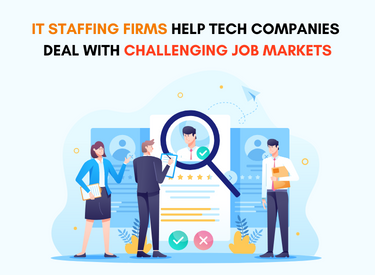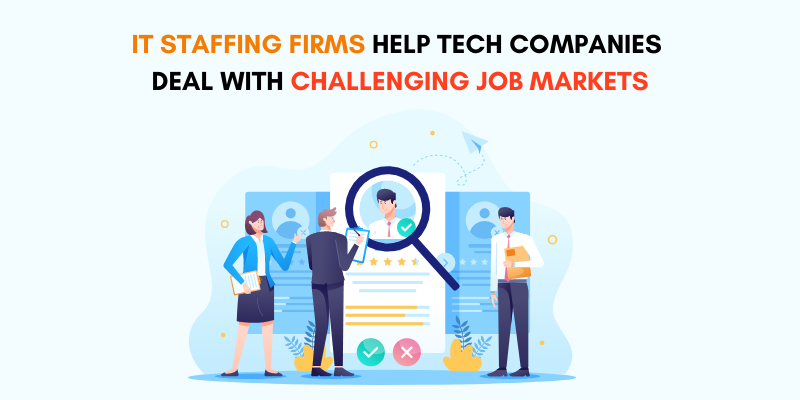IT Staffing Firms Help Tech Companies Deal With Challenging Job Markets


The technology industry is competitive, so hiring extra technical staff is often needed to finish a complicated project or ship a software product on time. But when it comes to hiring, companies can quickly run into a wide range of problems as they try to find increasingly scarce technical talent on a temporary or permanent basis. This is why the technology industry needs all the help it can get with IT staffing firms.
IT staffing companies help tech companies deal with changing (and often unpredictable) hiring markets by giving them the ability to add experienced engineering and talent when needed. Especially when there are gaps in technical skills in-house or when the workload becomes too much for the internal engineering team can handle on its own.
One of the best things about using IT staff augmentation services is that when the workload goes down, technology executives can choose to cut back on their teams without having to worry about full-time employees, their employment contracts, or the chaos that can come from making a lot of staff changes at once. Let’s look at how IT staffing agencies that offer staff augmentation services can help your company deal with these staffing problems.
The Best Things About Staff Augmentation Services
Technical staffing firms can help tech companies find talent in a very competitive job market by doing things like (but not limited to):
- The ability to closely monitor new staff in-house instead of handing extra responsibilities off to an external vendor’s project outsourcing team.
- Take on essential staff for set periods, like during a difficult release or a certain phase of a big project, without having to pay the costs of hiring full-time employees.
- Reduce the time and effort it usually takes to find skilled local workers when the tight job market.
- Get new hires from IT staffing agencies quickly on your company’s internal processes. Also, promptly add new technical talent to project or product teams already made up of your full-time employees.
- Take up slack when essential employees are on temporary leave or when you need to quickly add a new skill set to your team but don’t want to deal with the headaches of negotiating permanent or temporary job contracts (tech staffing firms responsible for handling contracts and paperwork) or the problems that come with trying to lure important talent away from other firms or competitors.
Examining the IT Staffing Market
IT staff augmentation companies offer many benefits to tech companies. Still, it’s also important to look at some of the more systemic risks associated with the technical recruiting and staffing market right now and for the foreseeable future.
The U.S. Bureau of Labor Statistics recently said there are more job openings in the U.S. than people looking for work. This means a fundamental lack of qualified talent in job markets across various industries. On top of that, a survey from Emerson said that in the next few years, there would be a shortage of millions of candidates with backgrounds in STEM fields.
And then there’s the fact that, according to LinkedIn Learning, the technology industry has the highest turnover rate of any sector (13.2%, based on data from “half a billion professionals”). This is likely because “high demand and rising pay” encourage skilled technical workers to take better-paying jobs when they come up, which they always do.
This shows that tech staffing services will play a very important role for a long time to come in helping technical firms hire and cut people while keeping the engines of innovation chugging along.
Why does adding more staff make sense
The good news is that tech companies, because of the fast-paced nature of the software industry and its dynamic, often-changing staffing needs, are in a unique position to take advantage of the staff augmentation model. Issues come with searching for, hiring, and then trying to keep technical talent in a competitive job market. Why? Here are 8 reasons:
- Combat High Attrition Rates: We’ve already discussed that software companies have high turnover rates. Using the staff augmentation model, tech companies can quickly hire engineers when their skills are needed. They can also replace workers who leave, which prevents project schedule slippage or delays and takes away a lot of the pain and worry that comes with a high turnover rate.
- Focus on Specific Technical Skills: Most of the time, in-house technical skill gaps happen when your team’s technical knowledge base is missing a certain skill. Tech staffing services help you fill those gaps by finding qualified candidates with the skills you need when you need them the most.
- Rapid Team Integration: Because IT staffing agency workers already have the technical skills your team needs, it’s usually easy to add them to existing software development teams without spending much time or money on training.
- Team Acceptance: Members of a remote outsourcing team are less likely to work closely with augmented staff than full-time employees. Most of the time, augmented hires fit in well with internal development teams. They don’t slow down the work or get seen as competition for permanent jobs inside the company.
- Reduce Employee Benefits Costs. Full-time employees usually get a lot of benefits, which can add a lot to a company’s overall costs. These costs don’t come with additional staff because staffing agencies take care of benefit costs, which are usually built into the resource billing rate.
- Reduce general overhead costs. When adding permanent employees, costs can quickly add up for new computers, screens, phones, office space, desks, parking spaces, and other things that come with having a new person in the office. Staff augmentation lets you avoid or cut down on costs that come with hiring people full-time.
- Meet Hard Deadlines: Sometimes, the deadline for a project comes up faster than your team of developers is ready. Staff augmentation is the perfect solution when this happens to your team because it lets you hire the extra coders you need to get good work done on time.
- Staff Flexibly: Software companies often face unexpected problems that create more work or a new project that needs to be started. This means that their staffing needs change frequently. Technical staffing firms help companies hire more people when needed and reduce the number of engineers who don’t need as many. This gives small and medium-sized businesses a lot of flexibility when they need to find the skills they need quickly in a competitive IT hiring market.
Read more: 5 Ways IT Outsourcing Service Can Help You Get to Market Faster
Locating Technical Talent Around the World
Most of the work of finding and hiring engineering and creative talent is done by staff augmentation agencies. However, the client still makes the most important decisions about where these resources come from, such as whether to work with augmented staff on-site to use onshore, nearshore, or offshore staffing.
On-site augmented staffing is an obvious choice when you hire more technical or creative talent quickly and integrate them into your project or product team or if your company prefers to develop software with a collocated team. New additions work right in your office and are under your control, and you can keep an eye on their day-to-day work and help team members work together face-to-face.
Domestic outsourcing, also called “onshore outsourcing”, is another great choice when you can’t find the talent you need in your area. When using the domestic outsourcing model to work with augmented staff, your internal team will talk to people who live and work in the United States but do so in a different city, region, or state. There aren’t any problems with language or culture, and the time zone differences aren’t too significant. This should help the project move along quickly.
When using nearshore staffing, you work with team members in different countries. A big difference between “nearshore” and “offshore” staffing is that “nearshore” IT workers are in the same time zone as your company or only a few time zones away, which makes it easier to talk to them during regular work hours. A good example would be a software company in California that works with a dedicated nearshore team in Mexico or a German company that hires remote workers from the growing IT experts in Eastern Europe.
Of course, suppose your company needs a specific skill that can’t be found locally. In that case, you can always hire people from offshore (often less expensive than nearshore or on-site solutions). There can be problems with time differences, language barriers, and cultural differences. However, experienced IT staff augmentation companies can help you work around these problems by giving you qualified offshore candidates with flexible work schedules who can help your company reach its goals.
Read more: 8 Engagement Models in Software Industry
Why do The Benefits of Staff Augmentation Outweigh the Risks?
Different risks come with different ways of managing technical resources on projects. With staff augmentation, these risks and drawbacks can come in the form of having to train additional hires to some degree on how your company works, allocating the extra resources needed to manage augmented staff, and understanding that talent from technical staffing firms is not the same as your permanent hires and is usually brought in for a specific reason.
But tech companies often run out of resources as hiring people gets harder and harder. This makes the benefits of staff augmentation clear when you look at how they affect a company’s bottom line. Staff augmentation saves software companies money and time that they would have spent looking for the perfect candidate.
Staff augmentation services also make it easy for companies to add or remove team members. This is helpful in a job market where it’s getting harder and harder to find software engineers. IT staffing agencies can help you quickly fill internal skill gaps on a tight deadline, closely manage your temporary workforce, and stay flexible regarding staffing up or down in a demanding industry that needs all the technical talent it can get.
